Spyridon Kantarelis
Go witheFlow: Real-time Emotion Driven Audio Effects Modulation
Oct 02, 2025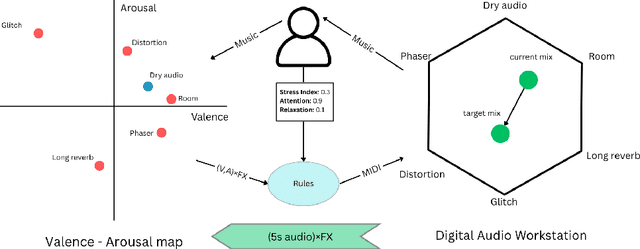
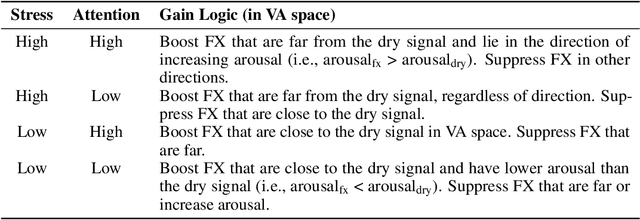
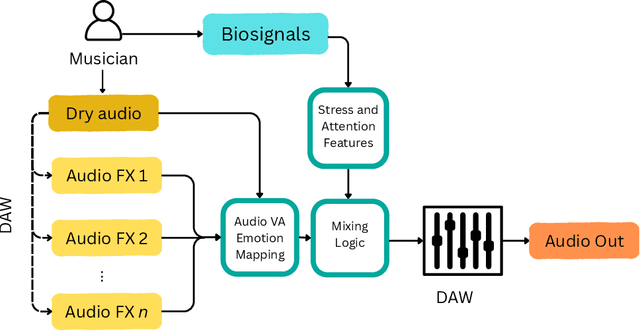
Abstract:Music performance is a distinctly human activity, intrinsically linked to the performer's ability to convey, evoke, or express emotion. Machines cannot perform music in the human sense; they can produce, reproduce, execute, or synthesize music, but they lack the capacity for affective or emotional experience. As such, music performance is an ideal candidate through which to explore aspects of collaboration between humans and machines. In this paper, we introduce the witheFlow system, designed to enhance real-time music performance by automatically modulating audio effects based on features extracted from both biosignals and the audio itself. The system, currently in a proof-of-concept phase, is designed to be lightweight, able to run locally on a laptop, and is open-source given the availability of a compatible Digital Audio Workstation and sensors.
Exploring How Audio Effects Alter Emotion with Foundation Models
Sep 18, 2025Abstract:Audio effects (FX) such as reverberation, distortion, modulation, and dynamic range processing play a pivotal role in shaping emotional responses during music listening. While prior studies have examined links between low-level audio features and affective perception, the systematic impact of audio FX on emotion remains underexplored. This work investigates how foundation models - large-scale neural architectures pretrained on multimodal data - can be leveraged to analyze these effects. Such models encode rich associations between musical structure, timbre, and affective meaning, offering a powerful framework for probing the emotional consequences of sound design techniques. By applying various probing methods to embeddings from deep learning models, we examine the complex, nonlinear relationships between audio FX and estimated emotion, uncovering patterns tied to specific effects and evaluating the robustness of foundation audio models. Our findings aim to advance understanding of the perceptual impact of audio production practices, with implications for music cognition, performance, and affective computing.
Semantic-Aware Interpretable Multimodal Music Auto-Tagging
May 26, 2025Abstract:Music auto-tagging is essential for organizing and discovering music in extensive digital libraries. While foundation models achieve exceptional performance in this domain, their outputs often lack interpretability, limiting trust and usability for researchers and end-users alike. In this work, we present an interpretable framework for music auto-tagging that leverages groups of musically meaningful multimodal features, derived from signal processing, deep learning, ontology engineering, and natural language processing. To enhance interpretability, we cluster features semantically and employ an expectation maximization algorithm, assigning distinct weights to each group based on its contribution to the tagging process. Our method achieves competitive tagging performance while offering a deeper understanding of the decision-making process, paving the way for more transparent and user-centric music tagging systems.
CHORDONOMICON: A Dataset of 666,000 Songs and their Chord Progressions
Oct 29, 2024Abstract:Chord progressions encapsulate important information about music, pertaining to its structure and conveyed emotions. They serve as the backbone of musical composition, and in many cases, they are the sole information required for a musician to play along and follow the music. Despite their importance, chord progressions as a data domain remain underexplored. There is a lack of large-scale datasets suitable for deep learning applications, and limited research exploring chord progressions as an input modality. In this work, we present Chordonomicon, a dataset of over 666,000 songs and their chord progressions, annotated with structural parts, genre, and release date - created by scraping various sources of user-generated progressions and associated metadata. We demonstrate the practical utility of the Chordonomicon dataset for classification and generation tasks, and discuss its potential to provide valuable insights to the research community. Chord progressions are unique in their ability to be represented in multiple formats (e.g. text, graph) and the wealth of information chords convey in given contexts, such as their harmonic function . These characteristics make the Chordonomicon an ideal testbed for exploring advanced machine learning techniques, including transformers, graph machine learning, and hybrid systems that combine knowledge representation and machine learning.
Perceptual Musical Features for Interpretable Audio Tagging
Jan 04, 2024



Abstract:In the age of music streaming platforms, the task of automatically tagging music audio has garnered significant attention, driving researchers to devise methods aimed at enhancing performance metrics on standard datasets. Most recent approaches rely on deep neural networks, which, despite their impressive performance, possess opacity, making it challenging to elucidate their output for a given input. While the issue of interpretability has been emphasized in other fields like medicine, it has not received attention in music-related tasks. In this study, we explored the relevance of interpretability in the context of automatic music tagging. We constructed a workflow that incorporates three different information extraction techniques: a) leveraging symbolic knowledge, b) utilizing auxiliary deep neural networks, and c) employing signal processing to extract perceptual features from audio files. These features were subsequently used to train an interpretable machine-learning model for tag prediction. We conducted experiments on two datasets, namely the MTG-Jamendo dataset and the GTZAN dataset. Our method surpassed the performance of baseline models in both tasks and, in certain instances, demonstrated competitiveness with the current state-of-the-art. We conclude that there are use cases where the deterioration in performance is outweighed by the value of interpretability.
Employing Crowdsourcing for Enriching a Music Knowledge Base in Higher Education
Jun 12, 2023
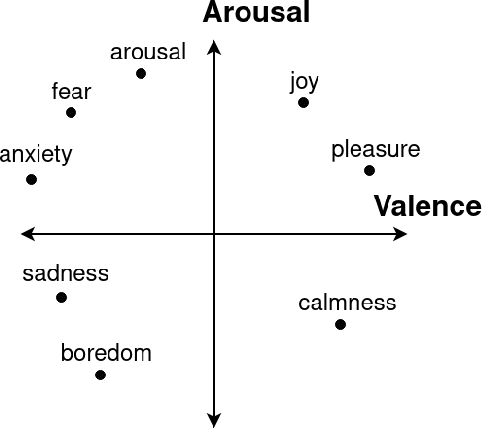
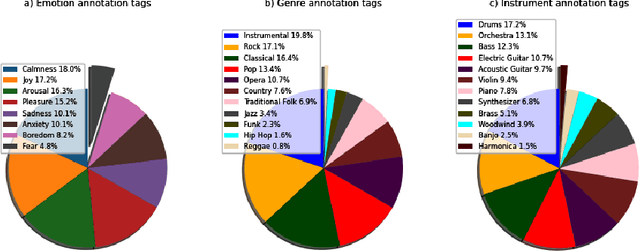

Abstract:This paper describes the methodology followed and the lessons learned from employing crowdsourcing techniques as part of a homework assignment involving higher education students of computer science. Making use of a platform that supports crowdsourcing in the cultural heritage domain students were solicited to enrich the metadata associated with a selection of music tracks. The results of the campaign were further analyzed and exploited by students through the use of semantic web technologies. In total, 98 students participated in the campaign, contributing more than 6400 annotations concerning 854 tracks. The process also led to the creation of an openly available annotated dataset, which can be useful for machine learning models for music tagging. The campaign's results and the comments gathered through an online survey enable us to draw some useful insights about the benefits and challenges of integrating crowdsourcing into computer science curricula and how this can enhance students' engagement in the learning process.
SpotHitPy: A Study For ML-Based Song Hit Prediction Using Spotify
Jan 19, 2023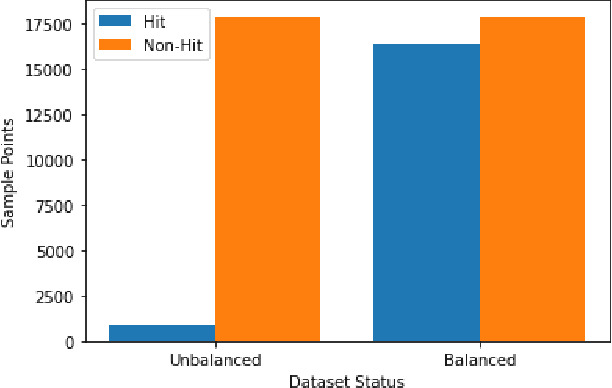
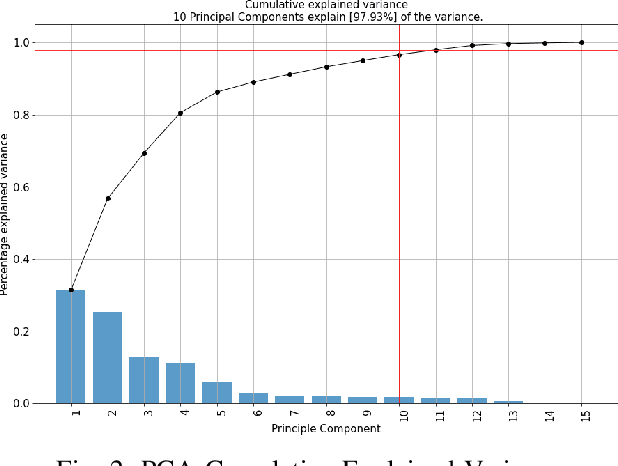
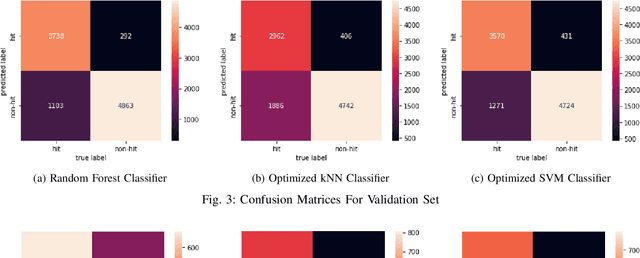
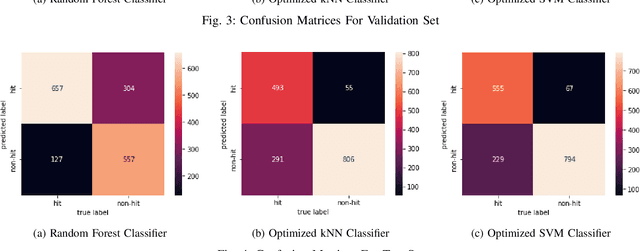
Abstract:In this study, we approached the Hit Song Prediction problem, which aims to predict which songs will become Billboard hits. We gathered a dataset of nearly 18500 hit and non-hit songs and extracted their audio features using the Spotify Web API. We test four machine-learning models on our dataset. We were able to predict the Billboard success of a song with approximately 86\% accuracy. The most succesful algorithms were Random Forest and Support Vector Machine.
 Add to Chrome
Add to Chrome Add to Firefox
Add to Firefox Add to Edge
Add to Edge